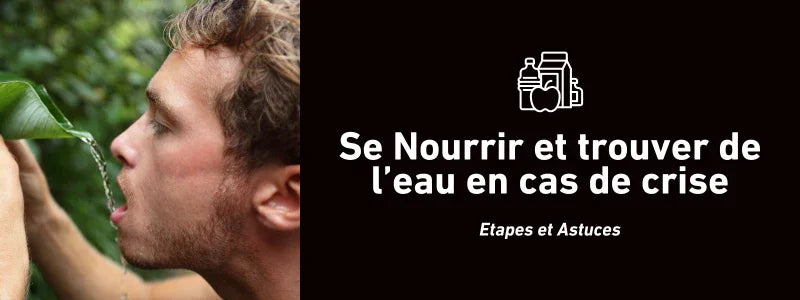In these uncertain times, the art of survival becomes a valuable skill for everyone. Whether you are a seasoned hiker, a concerned city dweller or simply a person with foresight, this guide is for you.
Introduction

In a world where uncertainty reigns, crisis can strike at any time. As a survivalist expert , we offer a guide to help you navigate these tricky situations with a focus on two essential elements: food and water .
Survival depends mainly on these two factors which can become scarce commodities during a disaster or natural disaster. Help is not always immediately available, requiring adequate preparation .
- First, it is crucial to know potential food sources.
- Second, you need to know how to purify and store water to ensure consistent hydration.
- Third, understanding how to effectively ration these resources is vital.
- We must be aware of the dangers associated with lack of nutrition and hydration.
This is the time to realize that every second counts when it comes to survival in difficult circumstances.
The basics of survival in a crisis
Finding drinking water
In a crisis situation, finding a source of drinking water is your priority . The human body cannot survive for long without hydration . Several techniques exist for finding water: morning dew, rivers and natural springs are all potential reserves. A waterproof bag will be useful for storing and transporting this precious resource.
Nourishing with nature
Healthy eating must be the heart of the fight in a crisis. Knowing how to recognize local edible plants can save your life. Consider rationing your portions to avoid any unnecessary overconsumption which could deplete your food stock prematurely.
Fishing and hunting techniques
Fishing or hunting can also provide a reliable source of nourishment when faced with a hostile environment. It is essential to learn how to preserve these foods, such as drying or smoking them to extend their life in your storage.
Essential equipment for feeding yourself and finding water in the event of a crisis
In a crisis situation, certain equipment is of paramount importance to ensure your livelihood. Among these essentials is the knife , a versatile tool par excellence, which will allow you not only to hunt but also to prepare your meals.
Just like the knife , don't forget to bring a lighter or any other means of ignition. The ability to make a fire is essential for cooking your food and purifying the water you may have to collect from nature.
A portable stove will also prove very useful for cooking more efficiently and preserving your fuel. However, keep in mind that it will never replace a good fire in situations where you need to heat yourself.
Finally, shelter is fundamental: a light and resistant tent will be your best ally against bad weather or simply for spending dry nights. With these four items in your pocket: knife, lighter, stove and tent; we can say that you will be well armed to face the challenges imposed by a crisis.
Additional tips for feeding yourself and finding water in a crisis
Collect rainwater and unconventional water
In a crisis context, water is a major concern for the survivor. Rainwater harvesting offers an effective solution to quench thirst. However, this requires precautions to ensure its potability.
- Water should be collected in a clean container.
- The collected water must be boiled.
- It must be allowed to cool before consumption.
- If necessary, filter through clean cloth or sand.
A National Geographic study (2019) highlights that certain plants and natural materials can also be used to filter water.
Know wild edible plants
To cope with hunger, it is crucial to know local edible plants. They represent an essential source of energy in addition to a limited ration. However, we recommend precise identification to avoid any poisoning.
Food preservation in a hostile environment
In a survival situation, preserving your food is essential in order to optimize each available ration. It is therefore appropriate to use all possible resources: drying in the sun, burying in fresh soil, etc. Each method thus ensures a constant supply in the face of the challenges imposed by the crisis.
